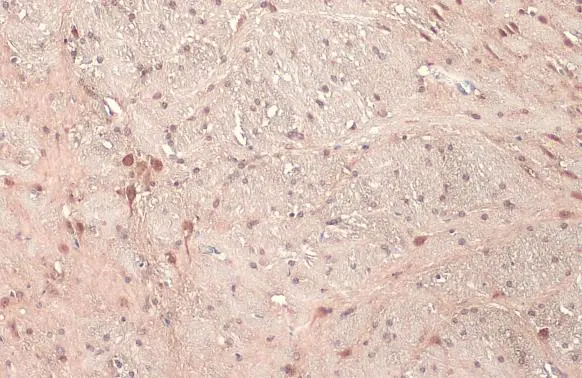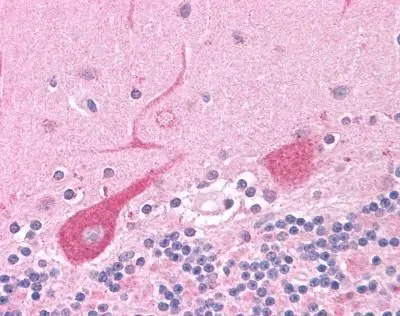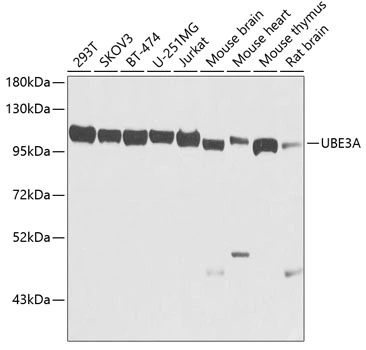![Various whole cell extracts (30 μg) were separated by 7.5% SDS-PAGE, and the membrane was blotted with UBE3A antibody [HL1660] (GTX637258) diluted at 1:1000. The HRP-conjugated anti-rabbit IgG antibody (GTX213110-01) was used to detect the primary antibody. Various whole cell extracts (30 μg) were separated by 7.5% SDS-PAGE, and the membrane was blotted with UBE3A antibody [HL1660] (GTX637258) diluted at 1:1000. The HRP-conjugated anti-rabbit IgG antibody (GTX213110-01) was used to detect the primary antibody.](https://www.genetex.com/upload/website/prouct_img/normal/GTX637258/GTX637258_T-44753_20220729_WB_22080119_828.webp)
Various whole cell extracts (30 μg) were separated by 7.5% SDS-PAGE, and the membrane was blotted with UBE3A antibody [HL1660] (GTX637258) diluted at 1:1000. The HRP-conjugated anti-rabbit IgG antibody (GTX213110-01) was used to detect the primary antibody.
UBE3A antibody [HL1660]
GTX637258
ApplicationsWestern Blot
Product group Antibodies
ReactivityHuman
TargetUBE3A
Overview
- SupplierGeneTex
- Product NameUBE3A antibody [HL1660]
- Delivery Days Customer9
- Application Supplier NoteWB: 1:500-1:3000. *Optimal dilutions/concentrations should be determined by the researcher.Not tested in other applications.
- ApplicationsWestern Blot
- CertificationResearch Use Only
- ClonalityMonoclonal
- Clone IDHL1660
- Concentration1 mg/ml
- ConjugateUnconjugated
- Gene ID7337
- Target nameUBE3A
- Target descriptionubiquitin protein ligase E3A
- Target synonymsANCR, AS, E6-AP, EPVE6AP, HPVE6A, PIX1, ubiquitin-protein ligase E3A, CTCL tumor antigen se37-2, E6AP ubiquitin-protein ligase, HECT-type ubiquitin transferase E3A, human papilloma virus E6-associated protein, human papillomavirus E6-associated protein, oncogenic protein-associated protein E6-AP, renal carcinoma antigen NY-REN-54
- HostRabbit
- IsotypeIgG
- Protein IDQ05086
- Protein NameUbiquitin-protein ligase E3A
- Scientific DescriptionThis gene encodes an E3 ubiquitin-protein ligase, part of the ubiquitin protein degradation system. This imprinted gene is maternally expressed in brain and biallelically expressed in other tissues. Maternally inherited deletion of this gene causes Angelman Syndrome, characterized by severe motor and intellectual retardation, ataxia, hypotonia, epilepsy, absence of speech, and characteristic facies. The protein also interacts with the E6 protein of human papillomavirus types 16 and 18, resulting in ubiquitination and proteolysis of tumor protein p53. Alternative splicing of this gene results in three transcript variants encoding three isoforms with different N-termini. Additional transcript variants have been described, but their full length nature has not been determined. [provided by RefSeq, Jul 2008]
- ReactivityHuman
- Storage Instruction-20°C or -80°C,2°C to 8°C
- UNSPSC12352203

![Various whole cell extracts (30 μg) were separated by 7.5% SDS-PAGE, and the membrane was blotted with UBE3A antibody [HL1660] (GTX637258) diluted at 1:1000. The HRP-conjugated anti-rabbit IgG antibody (GTX213110-01) was used to detect the primary antibody, and the signal was developed with Trident ECL plus-Enhanced. Corresponding RNA expression data for the same cell lines are based on Human Protein Atlas program. Various whole cell extracts (30 μg) were separated by 7.5% SDS-PAGE, and the membrane was blotted with UBE3A antibody [HL1660] (GTX637258) diluted at 1:1000. The HRP-conjugated anti-rabbit IgG antibody (GTX213110-01) was used to detect the primary antibody, and the signal was developed with Trident ECL plus-Enhanced. Corresponding RNA expression data for the same cell lines are based on Human Protein Atlas program.](https://www.genetex.com/upload/website/prouct_img/normal/GTX637258/GTX637258_44802_20220916_WB_TPM_watermark_22092119_451.webp)
![Non-transfected (–) and transfected (+) HeLa whole cell extracts (30 μg) were separated by 5% SDS-PAGE, and the membrane was blotted with UBE3A antibody [HL1660] (GTX637258) diluted at 1:500. The HRP-conjugated anti-rabbit IgG antibody (GTX213110-01) was used to detect the primary antibody, and the signal was developed with Trident ECL plus-Enhanced. Non-transfected (–) and transfected (+) HeLa whole cell extracts (30 μg) were separated by 5% SDS-PAGE, and the membrane was blotted with UBE3A antibody [HL1660] (GTX637258) diluted at 1:500. The HRP-conjugated anti-rabbit IgG antibody (GTX213110-01) was used to detect the primary antibody, and the signal was developed with Trident ECL plus-Enhanced.](https://www.genetex.com/upload/website/prouct_img/normal/GTX637258/GTX637258_44802_20221230_WB_shRNA_watermark_23010400_907.webp)
![Various whole cell extracts (30 μg) were separated by 5% SDS-PAGE, and the membranes were blotted with UBE3A antibody [HL1660] (GTX637258) diluted at 1:1000 and competitor's antibody (Competitor) diluted at 1:1000. The HRP-conjugated anti-rabbit IgG antibody (GTX213110-01) was used to detect the primary antibody. *The competitor is not affiliated with GeneTex and does not endorse this product. Various whole cell extracts (30 μg) were separated by 5% SDS-PAGE, and the membranes were blotted with UBE3A antibody [HL1660] (GTX637258) diluted at 1:1000 and competitor's antibody (Competitor) diluted at 1:1000. The HRP-conjugated anti-rabbit IgG antibody (GTX213110-01) was used to detect the primary antibody. *The competitor is not affiliated with GeneTex and does not endorse this product.](https://www.genetex.com/upload/website/prouct_img/normal/GTX637258/GTX637258_44802_20230616_WB_competitor_watermark_23062019_585.webp)




